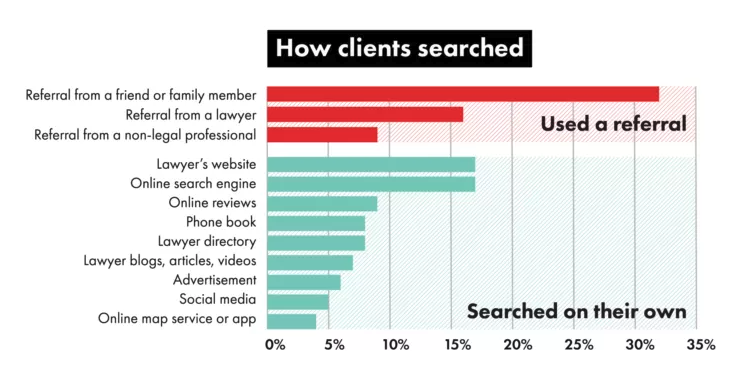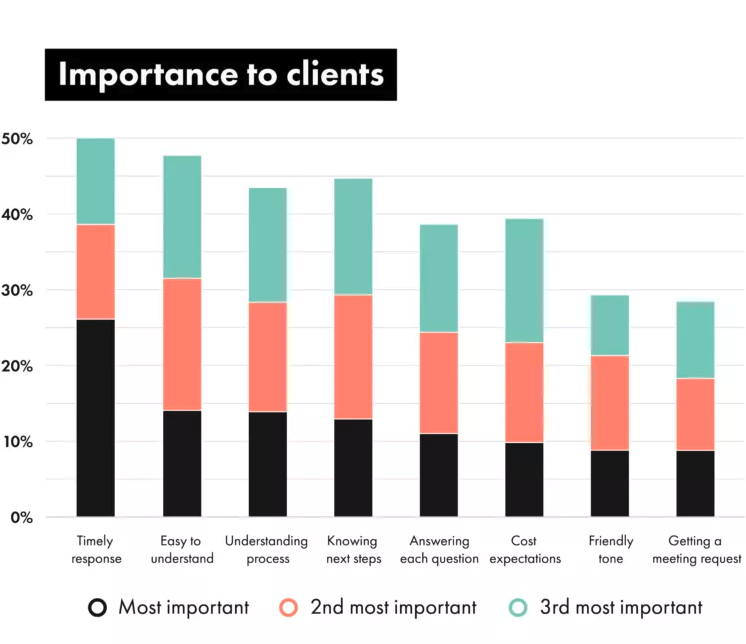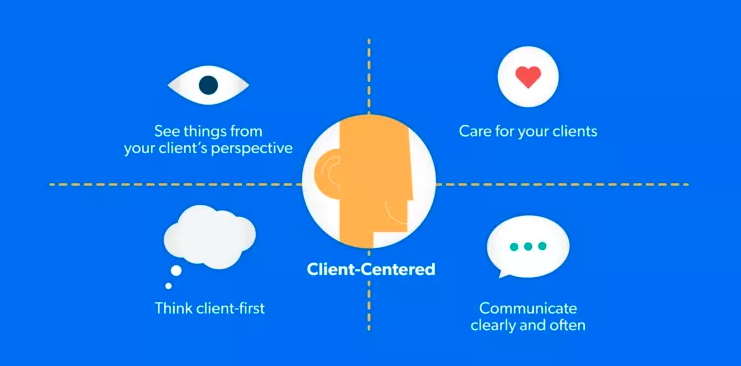Relationship building. Pressing the flesh. Developing new revenue streams. Cross-selling. This is the language of business development, and, much like marketing terminology, it is not familiar territory for most solicitors. As much as I’m prone to preaching about the place for marketing in every law firm’s toolkit, business development for law firms is the other side of the coin.
After reading this article, you will have a good idea of what business development strategies look like for law firms and some practical tips on how to integrate them into your job as a lawyer and business owner.
What is law firm business development?
Business development for law firms means pursuing strategic opportunities for your law firm. This includes building new relationships and identifying new revenue streams and sales opportunities. Examples are cross-selling to existing clients and adding new practice areas to your firm. It might involve geographic expansion, or setting up procedures for your client onboarding team to follow up with prospects.
Law firm business development vs. marketing
One of the reasons I love marketing is because you can seemingly create new business out of the blue. And depending on the advertising channel, the results can be instantaneous, through techniques such as turning on pay-per-click (PPC) ads and other forms of Google advertising. John Grisham writes books about the rainmaker, and that is precisely what a good marketing person is—a rainmaker.
In business development for lawyers, you’re still making it rain, but instead of the sales-focus one-time transactions of marketing, you build bridges, relationships, and revenue streams that are more sustainable and will serve you in the long run.
One might say that marketing is the here and now, putting your law firm in front of a client who needs your services. Unlike marketing, business development for law firms is about the long game—adding revenue and sales streams, practice areas, and relationships that build your practice over time.
You may like these posts
What does law firm business development mean for lawyers?
Law firm business development essentially means anything you do, in a systematic way, that expands your firm’s revenue streams. It takes into account strategies to grow revenue from a big-picture perspective rather than one-time transactional decisions.
I know what you’re thinking: “Okay, so what does this mean to me, a sole practitioner (or lawyer at a small firm)?”
Top 3 strategies for law firm business development
Here are a few of the most common strategies lawyers of any size can use to grow new business:
1. Build strong client relationships

The best way to get a new client is through existing clients. The 2020 Legal Trends Report reveals that a client looking for a lawyer will trust recommendations from friends and family first as well as online reviews on Google, social media, legal directories, or from past clients.
To ensure that past clients lead to referrals for new clients, law firms need to become client-centred and develop strong client relationships, both during and after the case. There are many ways to do this, but it largely boils down to making the client experience exceptional.

Other findings from the 2019 Legal Trends Report shows that communicating consistently, answering client inquiries, and being transparent with billing are all ways to make sure your clients feel they are getting the best possible experience and feel important.
To build strong relationships, focus on the five key aspects of running a client-centred law firm.

- See things from your client’s perspective
Creating a better client journey and overall client experience at your law firm means truly seeing things from your client’s perspective. Don’t make assumptions. Stay engaged with your clients and look for opportunities to get insight into their experiences.
- Care for your clients and consider their needs
Your clients don’t just come to you to get legal issues resolved. They come to you for peace of mind, reassurance, emotional support, advice, and more, during very stressful times in their lives. Lean into this with empathy and you could help your law firm stand out in a big way.
- Be client-centric in your thinking
When your law firm makes a decision, evaluates a new tool, or tries a new process, do you think about how it will impact your clients and their experiences? Thinking of your clients first at every stage of the client journey is the first critical step towards running a more client-centred practice.
- Communicate clearly and often
For client-centred law firms, communication means more than just providing updates on clients cases. It’s about being proactive so that clients feel informed, and taking the time to ensure clients truly understand everything that is going on. This is important throughout the entire client journey, from intake to invoice.
- Ask for feedback to continually improve the client experience
Don’t forget to ask for feedback from your clients. The best way to validate if your client experience is meeting expectations is to get feedback right from the source. Consider measuring client satisfaction as you go. Remember the old adage: “What gets measured gets managed.”
One very common way to do this is by measuring your Net Promoter Score (NPS®). The NPS® is a way of measuring which clients are likely to spread the good word about your service to others through reviews and referrals. You’ll also want to be proactive about managing your online reputation. This includes responding to negative reviews and asking current and former clients for feedback and positive reviews.
2. Networking

Truthfully, I didn’t become comfortable with networking until many years into my career. I needed to feel like I had something to give others versus acting like a recent law school graduate who was desperate for a job.
Nonetheless, law firm networking is something you have to do. My advice would be to forget about your hang-ups, force yourself to get out there, and just talk to people without having a motive or professional objective such as marketing in mind. Be yourself and create relationships. Once you’re more comfortable, you can think about how to get more out of your networking. For now, just showing up is a good start. And if you’re the type to drop social events the moment you get busy at work, using the conversation list strategy for law firm business development to maintain your relationships is a great way to stay social.
Remember, networking doesn’t just mean going to bar events. Think hard about what makes most sense for your practice area.
I know a solicitor who built an entire book of business through referrals by rubbing elbows in professional organisations and by being active in her local law society. In fact, at the law firm we worked at, she brought in more than three times her salary in billable hours through referrals.
Marketing and business development for law firms go hand-in-hand. While networking can take years to pay off in dividends, marketing can “turn the tap on” now, so to speak. The best approach is to do both for maximum effectiveness.
3. Asking for referrals
Many lawyers are afraid to ask for anything, even when it means free marketing. A simple client review? No way, that’s beneath them. Referrals? They aren’t begging for work.
The thing is, you know that you can provide superior services to anyone who is referred to your office. Asking for referrals isn’t asking for charity. It’s asking for opportunities to help human beings. And who better to help them than you?
How to create a law firm business development plan

Between a law firm business plan, budget, and law firm marketing plan, you might think that your firm is all planned out. Maybe, but it is important to think of your legal practice as a business. That is, the most successful businesses are the ones that take both marketing and business development seriously.
How do you create a lawyer business development plan? It’s simpler than you’d think and can be summed up in four basic steps:
- Create goals: Start by listing your business goals for the year. Do you want to start a new practice area? Become “the person” for an existing practice?
- Develop strategies: After you determine your new business and marketing goals, brainstorm a list of strategies that will help get you to those goals.
- Set your intentions: After you come up with your list, prioritise those strategies and write down the top two or three. Consider however many you have the time and budget to commit to. Roughly outline how you’re actually going to make it happen. For example, which networking events will you attend? What will a cross-selling process look like at your law firm?
- Review your plan: Revisit this plan every quarter or so, or when your business changes drastically. For example, you move locations, your firm grows, and/or you take on a new practice area. Be critical about what’s working and what isn’t.
Remember that, unlike marketing, business development for lawyers is a long game. Look at metrics that indicate long-term success rather than focusing on immediate results alone.
6 business development ideas for law firms
Here are a few strategies you may want to include as part of your law firm business development plan.
1. Commit to attend a certain number of networking events per year
Goals are easier to achieve if they are concrete. Commit to, let’s say, two events per month, especially if you’re a new business. At those events, go there without an agenda in mind and ask others about themselves. Have some fun and build some relationships.
We regularly have in-person and virtual events throughout the UK and Europe. Visit our events page to learn more.
2. Write or speak to demonstrate authority within your practice area
Are you an expert in your field? Prove it by committing to writing a few articles this year or committing to speak at a law society conference or other legal conferences, such as the Clio Cloud Conference. You can even see if there are any conferences outside of the legal industry that are relevant and might lead to more business referrals from non-lawyers.
3. Hire additional help and take on a higher caseload
If you are lucky enough to be turning down cases, is that actually what you should be doing? If you want to grow your business, then the answer is no.
4. Expand to a new geographic market
A survey by iLawyerMarketing found that 75% of consumers won’t travel more than 30 miles to a solicitor. With a statistic like that, it’s worthwhile considering adding a satellite office in a nearby town.
If you are in an area with high traffic or large commute times, the geographic distance may need to be even shorter. In many large cities, such as London, it’s not surprising if many consumers were to not be willing to travel outside of their own borough.
The best type of referral source: Client reviews
To date, the best move I’ve made has been to become utterly relentless on acquiring client reviews. When each case is done, I ask for a review before the final bill is sent out, and I follow up if they forget.
3 tools to help with law firm business development
1. Email and calendar
I know, this is a rudimentary suggestion, but keep this in mind: Many law firms, lawyers, and law societies operate in the dark ages. Announcements for local conferences or calls for articles are often sent via newsletters. Many will also maintain an online calendar of upcoming events, which is a lot handier than scanning your inbox every day.
2. A great CRM
A legal CRM is a contact relationship manager. It is basically the modern Rolodex, with logs of communications included. Clio Grow is an obvious choice here for Clio Manage users since the two fit together seamlessly. Clio Grow also works really well as a stand-alone solution.
Email and workflow automation allow you to automatically stay in touch with contacts. The ability to track where your leads and referrals originate will reinforce the value of business development in generating new clients.
3. Mailchimp (or any other drip email service)
Many lawyers find marketing newsletters to be a lot of work. And honestly, I don’t know any firm that does them well. In fact, I strongly recommend against sending a potentially boring newsletter stuffed with tidbits about your firm’s new staff members and sales pitches.
A more valuable use of inbox space is drip campaigns, where you send a series of nurture emails (like drops of water) to a certain type of contact. For example, if a potential new client emails you about estate planning, you might send a few drip emails addressing why they need to plan, the benefits of working with your law firm, and the costs of planning. You can also do this using Clio Grow’s email automation functionality.
(If this sounds like marketing, you are right. The idea of implementing this at your firm is business development.)
Invest in business development for your firm
It’s easy to get plugged into your legal work and forget about law firm business development and marketing. But remember, your law practice is a business. And in business, unless you are independently wealthy and don’t have to care about making a living, you have to keep an eye on the bottom line.
It all comes down to making a business development plan for your law firm. Outline your goals for the year. Brainstorm strategies to get you there. If you can commit to networking, demonstrating your authority, and enhancing existing client relationships, you’ll be able to optimise for repeat business, cross-sales, reviews, and referrals.
Remember: There is no “one size fits all” for law firm business development or marketing. Don’t be afraid to try a few different strategies. Remember: Business development is a long game of relationships and trust. The effects of your activities today may pay off for years to come.
We published this blog post in May 2024. Last updated: .
Categorized in: Business
Explore AI insights in our latest report
Our latest Legal Trends Report explores the shifting attitudes toward AI in the legal profession and the opportunities it brings for law firm billing, marketing, and more.
Read the report





